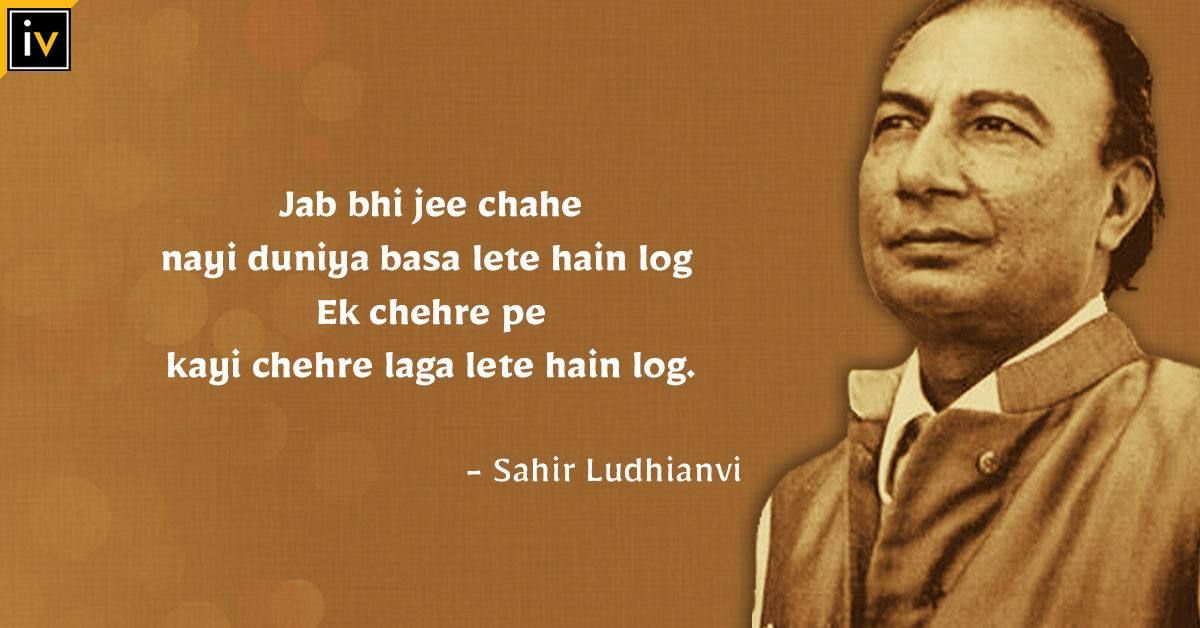Sahir Ludhianvi’s centenary was on March 8, this year. Seema profiles the multi-faceted, revolutionary poet, who emerged as the voice of the marginalised people. His love songs are intense, loaded with substance. A Special Feature and a tribute, exclusive for Different Truths.
It is difficult to say whether it was a great co-incidence or some deeper design of fate that Sahir Ludhianvi, one of the greatest poets of our times, a potent voice for women and the downtrodden, was born in the year 1921 on March 8, the day we celebrate the International Women’s Day. As we celebrate the centenary of this legendary poet, it is also time to reflect over the great and lasting appeal of the poet and his enduring popularity. What constituted the phenomenon called Sahir Ludhianvi, and more importantly, what is it that made him distinctive and different from the other poets of his times?
No account of Sahir’s poetry can be complete without going to his personal life, which was so full of struggles, anguish, and restlessness, consisting of the kind of stuff that films are made of.
No account of Sahir’s poetry can be complete without going to his personal life, which was so full of struggles, anguish, and restlessness, consisting of the kind of stuff that films are made of. In fact, movies like Pyaasa and Trishul reflect many aspects of his life. Faced with the many odds of life ever since his infancy, Sahir was filled with a bitterness that often finds an expression in the form of intense pain and turmoil to be found in many of his songs, as also in the title of his first collection, Talkhiyan:
दुनिया ने तर्जुबा–ओ हवादिस की शकल में,
जो कुछ मुझे दिया है, लौटा रहा हूँ मैं।
His mother’s separation from his father, a rich feudal landlord, doomed his early life to that of want and deprivation and the long legal battle his mother fought against his father for his custody deeply influenced his mind and sensibility, as he grew up nurtured by the love of his mother and with an intense hatred for his father.
Right from his youth and his college days, Sahir had become well-known for his revolutionary nazms…
Right from his youth and his college days, Sahir had become well-known for his revolutionary nazms like, Ik Shehnshah Ne Daulat Ka Sahara Lekar / Hum Garibon Ki Mohabbat Ka Udaya Hai Mazak / Mere Mehboob Kahin Aur Mila Kar Mujhse and had earned a name for himself in Mushairas, at Lahore. After shifting to Bombay, in 1946, before the partition, Sahir became successful as a lyricist in Hindi films and gave immortal songs in partnership with Vasanth Kumar Shivashankar Padukone, better known as Guru Dutt, Mohammad Rafi, and S D Burman.
After Pyaasa, he parted ways with SD Burman and gave songs that were equally hit and popular with music composers like Roshan, Ravi, O P Naiyyar, Khyyam, N Dutta, Laxmikant Pyarelal etc. He also revolutionised the outlook of the people in the film industry towards lyricists and insisted on their being accorded due recognition and respect. This could only be done by someone who had tremendous confidence in the efficacy of his verse, something amply validated by his consistently successful songs in movie after movie.
His songs have seeped into our collective consciousness and are a part of our rich cultural legacy.
It is a pleasant reality that we have grown up listening to the great songs that were composed by Sahir and immortalised through the medium of Hindi cinema. His songs have seeped into our collective consciousness and are a part of our rich cultural legacy. Focusing upon his contribution to Indian cinema, one can trace the journey of the poet from success to success as he wrote everlasting songs for many hit films in the decades of the 50s, the 60s and the 70s. One can talk about films like Naujawan (1951), Baazi (1951), Pyaasa (1957), Dhool Ka Phool (1959), Hum Dono (1961), Didi, Jaal, Phir Subah Hogi (1959), Barsaat Ki Raat (1960), Hamraaz (1967) Tajmahal, Waqt (1965), Naya Daur (1957), Gumraah (1963), Chitralekha (1964), Kaajal (1965) and later films like Neel Kamal (1968), Trishul (1978), Kabhie Kabhie (1976), and many more for which Sahir wrote some 750 songs, many of which continue to be extremely popular till date. What is amazing is the enormous range and diversity of the body of Sahir’s voluminous bulk of poetry, besides its magical appeal, matchless lyricism, and uniqueness of perspective.
If one looks at the vast universe of Sahir’s poetic creations, one is mesmerised by the hypnotic beauty of his songs as much as by the profundity and diversity of his themes. An attempt is being made here to look at some of the immortal songs and the issues and aspects of life they engage with.
Sahir’s poetry is multi-faceted, with myriad shades and nuances of life portrayed with exceptional charm, melody, and beauty.
Sahir’s poetry is multi-faceted, with myriad shades and nuances of life portrayed with exceptional charm, melody, and beauty. Many of his romantic songs are full of the intensity of love and romance, with their lilting, passionate and mesmerising beauty that enthral and captivate poetry and music lovers even till today. Given here are some of them:
- · Abhi na jaao chhod kar
- · Nigaahen milane ko ji chahta hai
- · Uden jab jab julphen teri
- · Ye raat ye chandni phir kahan
- · Choo lene do naazuk honthon ko
- · Tere chehre se nazar nahin hatati nazaare hum kya dekhen
- · Dil mein kisi ke pyar ka jalta hua diya
- · Kabhi kabhi mere dil mein khyal aata hai/Ki tujhko banaya gaya hai mere liye
- · Milti hai zindagi mein mohabbat kabhi kabhi
- · Chehre pe khushi aa jaati hai
- · Zindagi bhar nahin bhoolegi voh barsaat ki raat
- · Door rah kar naa karo baat karib aa jaao
- · Ai meri zohra zabin
- · Tere pyar ka aasra chahta hoon
- · Jaane kya tune kahi, jaane kya maine suni, Baat kuchh ban hi gayi
- · Maang ke haath tumhara, maine maang liya sansaar
- · Hum intzaar karenge tera qyamat tak
- · Mere dil main aaj kya hai
- · Aaj sajan mohe ang laga lo janm safal ho jaaye
Some of the songs beautifully capture the anguish and pain of unrequited love are:
- · Aa jaa tujhko pukare mera pyar
- · Chalo ik baar phir se ajnabi ban jaayen hum donon,
- · Tum mujhe bhool bhi jaao to ye haq hai tumko
- · Kissi pathar ki murat se mohabbat ka irada hai
- · Rang aur nor ki baraat kise pesh karoon,
- · Kabhi kabhi mere dil main
- · Main jaanta hoon kit u gair hai magar phir bhi
Quite a few resonate with a deep sense of melancholy, pessimism and echo a plaintive note bordering on disillusionment with this world or even life itself:
- · Tang aa chuke hain kashm-kashe zindagi se hum
- · Jaane vo kaise log the jinke pyar ko pyar mila
- · Kabhi khud pe kabhi halaat pe rona aaya,
- · Dekha hai zindagi ko kuchh itne kareib se
- · Ye mahlon ye takhton ye taajon ki duniyaan, ye duniya agar mil bhi jaaye to kya hai
And sometimes there is an effort to overcome that pain and disappointmentinhis songs:
- · Main zindagi ka saath nibhata chala gaya
- · Vo subah kabhi to aayegi

He also portrays the moments and sentiments of amorous complaints or counter complaints of lovers’ roothhna-manana…
He also portrays the moments and sentiments of amorous complaints or counter complaints of lovers’ roothhna-manana or gila-shikwaa as in:
- · Aana hai to aao bulayenge nahin
- · Gairon pe karam apnon pe sitam
- · Phool gendwa naa maaro
- · Tum agar mujhko naa chaaho to koi baat nahin
Some songs present the dichotomy of love as the most valuable / useless thing in this materialistic world:
Mohabbat bade kaam ki cheez hai Ye bekaar bedam ki cheez hai While some are intensely passionate in a patriotic vein: Ye desh hai veer jawanon ka
Some of the songs reflect deeper philosophical side of lifepresented with great melody and ease:
- · Main pal do pal ka shaayar hoon,
- · Aage bhi jaane na tu
- · tadbeer se bigdi huyi taqdeer bana le
- · Zindagi hansne gaane ke liye hai pal do pal
Or the hymn celebrating the oneness of God:
Allah tero naam ishwar tero naam
Or the ever-lasting immortal classic, a must for the occasion of Indian marriages when the bride is leaving her parents’ home:
Babul ki duaaen leti jaa Or a general one like Tora man darpan kahlaye
The unforgettable song from Trishul is reminiscent of his own personal life…
The unforgettable song from Trishul is reminiscent of his own personal life, childhood and portrays his mother as an extraordinarily strong woman:
Tu mere saath rahega munne Main tujhe reham ke saaye mein na palne doongi Zindagi ki kadi dhoop main chalne doongi
Sahir did not, like some of his contemporaries, write songs in praise of husn (beauty) or jaam (wine) or God. His songs which express an undisguised frontal and bitter critique of the societal structures, the economic inequalities, the oppressive power paradigms, the narrative of war, of hate pedalling in the name of religion, on the declining human values and the exploitative patriarchal structures degrading womento the level of commodities deserve to be devoted due attention.
His songs are indictment of hegemonic structures:
- · Tu hindu banega na musalmaan banega
- · Mere mahboob kahin aur mila kar mujhse/Ik shehnshah ne banwa ke haseen tajmahal
- · Jinhe naaz hai hind par vo kahan hain/Ye kuche ye neelamghar dilkashi ke
- · Wo subah kabhi to aayegi
- · Cheen aur arab hamara/Rehne ko ghar nahin hai/Saara jehan hamara
The two poems given below are extraordinarily strong indictment of the narrative of war, followed by power hungry politicians and its devastation unleashed upon the common people…
The two poems given below are extraordinarily strong indictment of the narrative of war, followed by power hungry politicians and its devastation unleashed upon the common people, exhort all right-thinking people to avert this threat that looms large upon humanity and appeal for peace and happiness, for creating a world based on love and happiness, rejecting the destruction of war:
ख़ून अपना हो या पराया हो
नस्ले-आदम का ख़ून है आख़िर
जंग मग़रिब में हो कि मशरिक में
अमने आलम का ख़ून है आख़िर
बम घरों पर गिरें कि सरहद पर
रूहे-तामीर ज़ख़्म खाती है
खेत अपने जलें या औरों के
ज़ीस्त फ़ाक़ों से तिलमिलाती है
टैंक आगे बढें कि पीछे हटें
कोख धरती की बाँझ होती है
फ़तह का जश्न हो कि हार का सोग
जिंदगी मय्यतों पे रोती है
इसलिए ऐ शरीफ इंसानो
जंग टलती रहे तो बेहतर है
आप और हम सभी के आँगन में
शमा जलती रहे तो बेहतर है।
***
बहुत दिनों से है यह मश्ग़ला सियासत का,
कि जब जवान हों बच्चे तो क़त्ल हो जायें।
बहुत दिनों से है यह ख़ब्त हुक्मरानों का,
कि दूर-दूर के मुल्कों में क़हत बो जायें॥
For many days, it has been a hobby of politicians
That when kids grow up, they are murdered
For many days, it has been an obsession of rulers
That in faraway countries, famine may be sowed.
……
चलो कि चल के सियासी मुकामिरों से कहें,
कि हम को जंगो-जदल के चलन से नफ़रत है।
जिसे लहू के सिवा कोई रंग रास न आये,
हमें हयात के उस पैरहन से नफ़रत है।
Let’s go to the political gamblers and tell them
That we abhor the tradition of conflict and war
The one that is not compatible with any color except (that of) blood
We abhor that mantle of existence.
…….
कहो कि आज भी हम सब अगर खामोश रहे,
तो इस दमकते हुए खाकदाँ की खैर नहीं।
जुनूँ की ढाली हुई ऐटमी बलाओं से,
ज़मीं की खैर नहीं आसमाँ की खैर नहीं॥
(Say that today that if we remain silent even today
Then this glowing soil is bound to be doomed
From the atomic monsters, shaped by madness
The Earth is threatened, the sky is threatened)
The immortal songs of the great lyricist bear ample testimony to his everlasting popularity and appeal. It is exceedingly difficult to encompass the ocean-like vastness and depth of Sahir’s poetry in just one article. It would be like trying to hold the ocean in a pitcher. But this tribute hopes to be “like a window where through gleams that vast untraveled world whose margin fades forever and forever as we move” to borrow the words of Alfred Lord Tennyson, for the lyrical poetic world of the great poet-lyricist Sahir Ludhianvi.
Visuals and video clips from the interenet.





 By
By
 By
By
 By
By
 By
By
Beautiful tribute to great poet and lyricist and a peep into his diverse poetic world!
Beautiful tribute to great poet and lyricist and a peep into the wide range of his creativity!